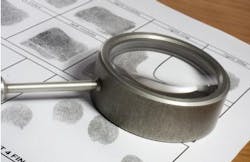When I mention the acronym “CSI,” what do you think of? Like me, you probably think of the long-running TV shows where the term stands for “Crime Scene Investigation.” I like those shows and, as an unreformed engineer—despite years of business development work—I am intrigued by the science involved. So, I am now taking a course in forensic science.
It’s really interesting to see how forensic science relates to business development. Don’t believe me? Read on.
In today’s vernacular, the definition of “forensic” (as related in the OED) is “Of, relating to, or denoting the application of scientific methods and techniques to the investigation of crime.” But did you know that there is a much older definition? That is: “Relating to, used in, or appropriate for courts of law or for public discussion or argumentation.” So, in reality, this definition of forensics is really about development of an argument that supports a position that can be debated. (Anyone ever heard of the “Forensics Club”? Our high school had one.)
As I think about business development, it really is the development of an argument that supports a position that can be debated. We go out and gather evidence from a variety of sources (the tools of which are loosely called the “marketing mix”—a term coined in 1953 by Neil Borden, then president of the American Marketing Association). Evidence gathered forms an argument to pursue a possible business opportunity. The key point is that those opportunities are not certain, they are only prospective. So we can see that, just as in a crime investigation where information (evidence) is gathered when a whodunit is not certain, marketing evidence is gathered in a setting where the viability of an opportunity is also not certain.
Class evidence
Marketing information (the evidence) is almost exclusively (what in forensic science is called) “class evidence.” It is not irrefutable, so basing a business decision on this kind of evidence carries risk, just as basing a criminal case on “class evidence” is risky—insufficient to lead to successful prosecution. To illustrate this, consider:
Forensic science: A hair is found in a victim’s apartment. It is analyzed and seen to be brown in color, and from a person of Caucasian extraction. This likely means that the perpetrator is Caucasian and has brown hair, but nothing more than that. So: the evidence only narrows down a class of suspects. It would be unsupportable to prosecute a suspect based on this class evidence alone.
Business development: You get word that the budget has been approved for a project where 100 new ships will be built. You know that ships use widgets, and you build widgets—so you calculate that this opportunity is worth 1,000 widgets. You better get on it! This is class evidence of an opportunity, but nothing more. It would be unsupportable to prosecute an opportunity based on this class evidence. (Yet, I have seen cases where such class evidence makes an opportunity a prime target, naïvely driving the sales folks and the product folks into high gear chasing it.)
Individuating evidence
In both cases, what is needed is “individuating evidence.” In forensic science, this means more in-depth “crime scene investigation.” In business development, it means in-depth “customer specific information.” (See what I did there?)
Most often, class evidence will be a good start; it narrows down a group of people, companies or opportunities that need deeper investigation. As “individuating evidence” is gathered (in forensic science, maybe this is a fingerprint or DNA; in business development, it would be a set of goals direct from customer contact): a deeper understanding is reached, and a solution (suspect) is hypothesized. Just as we all know that a good suspect does not insure success in prosecution, a good solution may not either.
In the legal system, we have prosecutors who prepare cases. Which cases are pursued is based on their chance of success using the evidence they have. Only those with enough supporting “individuating evidence” proceed to court. Our business development “prosecutors” are our technical sales team—professional system architects, computer designers, application specialists and yes, even us business development guys. We work with customers to determine what is actually needed and wanted—gaining the specifics we need to make a case. And just as in the justice system, we first decide internally if the opportunity can be prosecuted (do we have, or can we affordably make, the right product?). If we can, we return to the customer, presenting our case using “individuating evidence” matched to our solution.
Taking a “forensic” approach with business development is work. It demands rigor and talking to a lot of folks to get clear evidence. To some, this process seems overly costly in time and effort. But: just as in criminal cases, the better the case is prepared, the better the outcome. We gather evidence from many sources (users, specifiers, engineers, program managers, budget controllers—from the soldiers in the field to the generals in the Pentagon) and not just those who buy from us. This sometimes causes our customers to ask: “Why are you going to see my customer? They don’t buy from you. We do.” My response is always the same: “Because when we know what you need to provide, we know much better what we need to do to support you.” Because we have developed a case, built on forensic analysis, we ensure that our product is compelling to the customer and supported by our business.
About the Author

